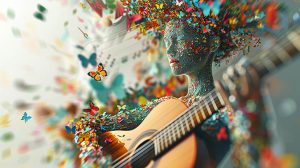
The Benefits of the Ear to Instrument Connection
I recently watched a video performance by the amazing classical pianist Yuja Chang. I’ve seen her memorizing motion and heard her virtuosic playing before, but something hit me after seeing
Categories:
Categories:
Yesterday, while speaking to a well-known artist, it became apparent to me that he was not a fan of Artificial Intelligence. We never spoke about AI in detail, but I could tell when the topic of AI came up in the conversation. He seems to be following the belief in the artificial Intelligence doomsday.
He’s not alone. The small sample of musicians with whom I’ve talked to about AI combined with the things I see on the internet prove that my friend is not in a minority in his distrust and dislike of artificial intelligence
Fear and distrust over new technology is as old as time. The invention of the printing press brought about much of the same hysteria over the changes it promised to bring:
Fears and distrust over technology seems to always stem from not seeing the full future context the new technology will bring about.
For example, much of the career work around the horse trade (boarding, food and bedding production, horse shoeing, etc.) started disappeared in the 1920s after the proliferation of the automobile. If the people within the horse trade had done nothing but continue to cater to the horse industry, they would have starved from the lack of demand for their work. But they didn’t.
Begrudgingly at first, they learned new skills like making automobile parts, working in a factory, paving roads, etc. Their economic worth increased and therefore, so did their standard of living. The automobile industry improved their lives through the lever of technology by graduating them out of the horse trade.
Back to the printing press, The Church knew exactly what printing would do to Church doctrine and control. Because of mass printing, new and different information was available to the masses. Silly superstitions and religious dogma started to disappear as people became more reality-oriented which lead them to the Enlightenment. The church lost much of its monopoly over ‘truth’ and, as a result, life for the vast majority of Earth’s population got a LOT better.
This is the pattern: New technology is made available that allows people to do things they’ve never before done. That new ‘thing’ makes older things obsolete or more expensive. The people vested in the old ways resent the new tool and often try to prevent it or at least neuter it.
Obviously, much of the resentment toward the new technology is fear of losing income or status, but much of the reason people fight the new technology is because they are looking at the future within the current context.
Despite AI, many artists will continue doing what they’ve always done–paint with the same artistic inspiration, compose music limited by their knowledge of music, design buildings as they’ve always imagined them, and write based on their own vocabulary, sense of style, and imagination.
Their instinct is to fight the thing they see as taking their place or diminishing their status. Because as they continue to do what they’ve always done, they sense they are at risk of being left behind by those who use this super genius assistant called AI.
My hope for these artists is that rather than fighting AI, begging for government controls, and suing its purveyors, they will recognize the power it provides them to elevate their own art.
Rather than fighting the inevitable losing battle to stop AI, artists should use it to leverage their own creativity, knowledge of their medium, and ability to make money using this super genius assistant who never sleeps or complains!
Now, if your fear is that that assistant and all others will take over the planet, that is a separate topic. I believe that that fear is unfounded, but let’s leave that discussion for another day.
The first was a woman who saw a piece of art that blew her mind. She loved it, but after she saw that it was created using artificial intelligence, she hated it.
The second was someone who admitted that the reason he doesn’t like AI generated art is that doesn’t come from an artist and there is therefore, no one to support.
My first reaction was, I don’t buy art primarily to support an artist. I buy art because it resonates with me. Who created it is secondary.
But my more important reaction is that generating good art using AI is not simply a process of telling the machine to create something cool and.. presto! Something remarkable pops up like a genie out of the bottle.
AI is a tool that, in skilled hands, can create remarkable things, from websites, to building designs, to music, to artistic visuals. But the result still rests with the human starting point.
Remember the line early on in the movie Limitless staring Bradly Cooper? His ex-girlfriend’s brother was trying to sell him the benefits of the super-intelligence drug, NZT-48. The line was that the super drug “Works better if you’re already smart.”
The same can be said about artificial intelligence. It helps more if you’re already talented.
If you don’t think AI art requires hard work and talent, take a look at an instagram page dedicated to Dali or Mid Journey. You will see varying levels of talent, and it is not just because one artist has a better computer. It’s because the artistic sense of the person using AI shows through the work. Here’s an architectural image artist to get you started.
AI is simply a tool, and like any tool, it works as well as the person using it. Did the printing press provide mass production of crap? Of course. But it also gave the people access to great literature and ideas that changed the world.
My hope is that you won’t try to fight AI but instead, discover how best to use it for your own art. I’ll leave you with an example from my own holiday season use for the visuals over my music:

Trombonist, author, marketer, & tech guy
Share this post…

I recently watched a video performance by the amazing classical pianist Yuja Chang. I’ve seen her memorizing motion and heard her virtuosic playing before, but something hit me after seeing
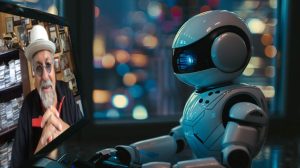
I have created a AI chatbot called Jazz Master Chat that draws from 75 hours of interviews from my Jazz Master Summit event a couple of years ago. I interviewed

What is jazz improvisation? Let’s first define what I mean by jazz improvisation. Jazz improvisation is a spontaneous conversation, but instead of words, we use notes. Look at two possible
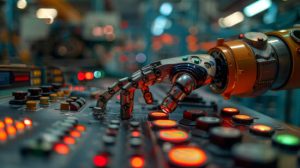
My recently turned 18 year old son is a passionate photographer He 8217 s got himself a little business

A couple weeks ago I sent Richie Beirach a YouTube clip from the movie Whiplash as a bit of
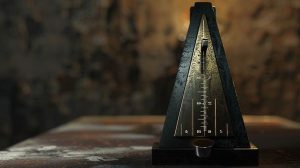
I originally meant to write this as a reply to a comment Richie Beirach wrote on my blog But
Tools for helping musicians at all levels learn about jazz and play to their full capability.
Web design and marketing by:
Michael Lake @JazzDigitalMarketing.com
This is just a fake book example for the type of website I can build for you. Just trying to use a little humor here!
1 thought on “Artificial Intelligence Doomsday?”
Pingback: Rhythm of Life - Music Savvy